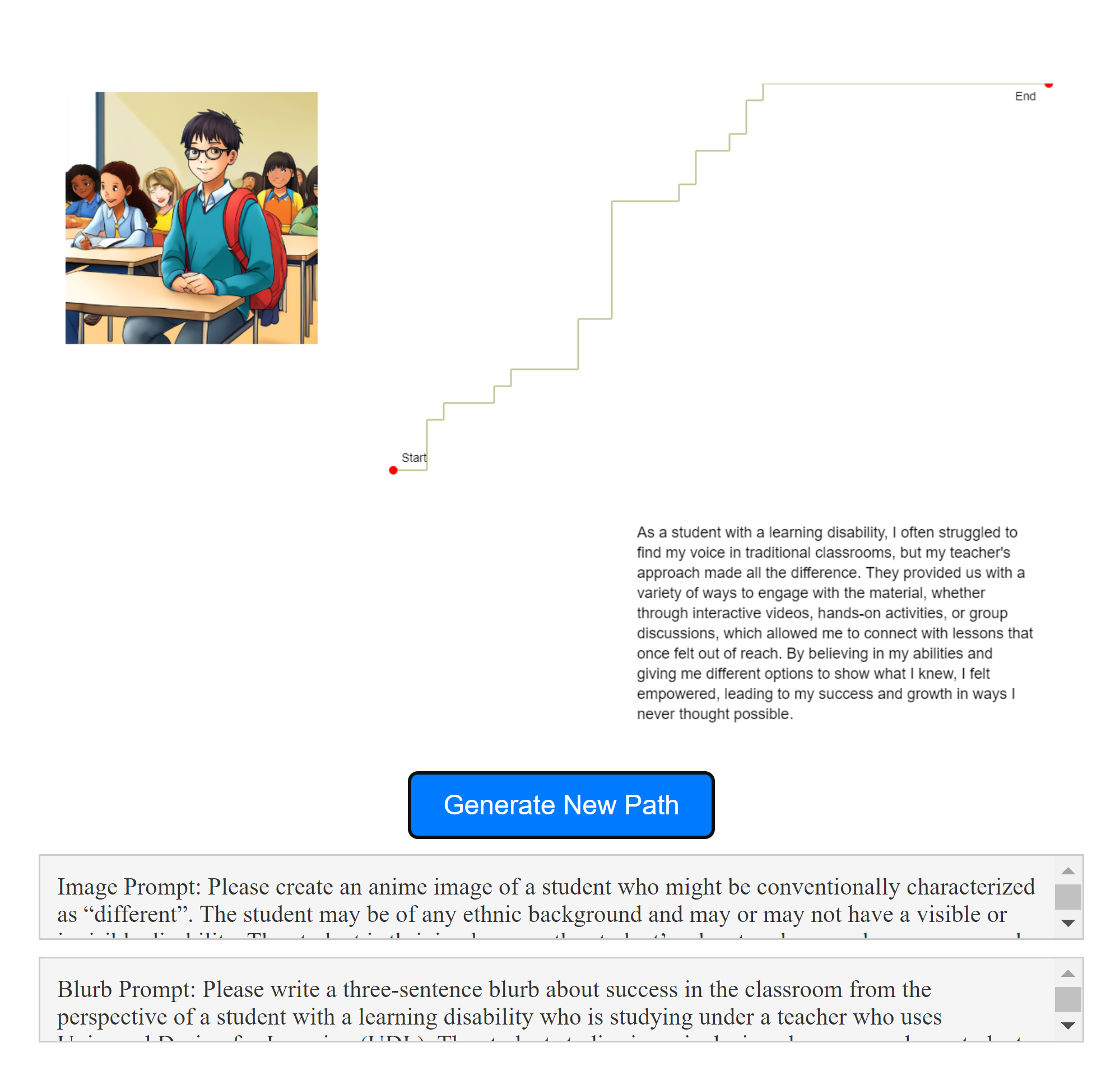Assignment: Multimodal Reflection
Live Multimodal Reflection

Course Information:
-
Course: C&T 4001 Summer 2024 - Inclusive Instructional Approaches for Diverse Learners - Instructor: Maddie Neufeld, Instructor, Elementary Inclusive Education Program
Assignment: Multimodal Reflection, Part 1, due 7/23
- Consider how your thinking so far in this course emerged/shifted/developed in relation to inclusive education and disability
- Reflect on this in relation to course content through two modalities (one should be language based – written or spoken)
- Some ideas for possible modalities: performance, video, audio, creative writing, visual art, food, music, slides, sculpture, games…something else!
- Assessed on analysis through creative expression, not on technicalities of the expression
- Be prepared to present your work in class
Assignment: Multimodal Reflection
Posted on July 22, 2024
“MyPath”
I used a combination of a visual maze, artificial intelligence text and image outputs, and prompting to generate a canvas that illustrates the journey and experiences of a student with a disability in an inclusive classroom.
Services used:
I used Render.com to host my application. I used Eden AI’s API for image generation and GPT-4o Mini for blurb generation. I coded the maze visualization and interaction with the help of GPT-4o. The prompt writing is my own.
Image Generation:
For the image generation, I provided the following prompt:
“Please create an anime image of a student who might be conventionally characterized as ‘different’. The student may be of any ethnic background and may or may not have a visible or invisible disability. The student is thriving because the student’s educators have undergone personal and professional transformations that have prepared them for doing inclusion (Danforth, 2014). These educators have rejected using ‘normality’ as a tool for limitation and oppression, recognizing it instead as a malleable social construct (Sapon-Shevin, 2013). The student is also thriving because the student’s competence has been presumed first – the student does not need to prove first whether the student is ready for inclusion or whether the student can learn – and we give the student the opportunities and resources to learn in ways that play to their strengths (Five Moore Minutes, 2021).”
Blurb Generation:
For the blurb generation, I used this prompt:
“Please write a three-sentence blurb about success in the classroom from the perspective of a student with a learning disability who is studying under a teacher who uses Universal Design for Learning (UDL). The student studies in an inclusive classroom, where students can learn without being segregated or singled out due to perceived disability. The student’s performance flourished when their teacher presumed their competence (Five Moore Minutes, 2021). Their teacher followed the three core principles of UDL (Universal Design for Learning): Engagement (motivating all learners to do their best work by getting them interested, challenging them, and keeping them motivated. This is achieved by implementing classroom strategies that empower and engage students, providing choices, reducing anxiety, and rewarding effort), Representation (focuses on teaching content in an accessible way by presenting it through various modalities such as videos, websites, pictures, and realia), and Expression (offering students multiple options to demonstrate their learning, moving beyond traditional tests and papers to include methods exploiting student strengths) (Spencer, 2011). The student states explicitly their disability, how their teacher allowed for achieving success, emphasizing how inclusive education practices helped them find their own path to learning. The student should not use technical language about UDL in their blurb, however the strategic pedagogical intentions of the teacher should be inferable or implied in the blurb. Please be specific, as this inference will be run multiple times, and we desire a unique story each inference.”
Bibliography:
Danforth, S. (2014). Becoming a great inclusive educator. Peter Lang Publishing.
Five Moore Minutes. (2021, February 1). The Importance of Presuming Competence [Video]. YouTube. https://www.youtube.com/watch?v=6Mq8sQTEhG8
Sapon-Shevin, M. (2013). How we respond to differences—and the difference it makes. In J. Lawrence-Brown et al., (Eds.), Inclusive education: Responding to the complexity of differences (pp. 29-45). Thousand Oaks, CA: Corwin Press.
Spencer, S. A. (2011). Universal design for learning: Assistance for teachers in today’s inclusive classrooms. Interdisciplinary Journal of Teaching and Learning, 1(1), 10-22.
Reflection:
…